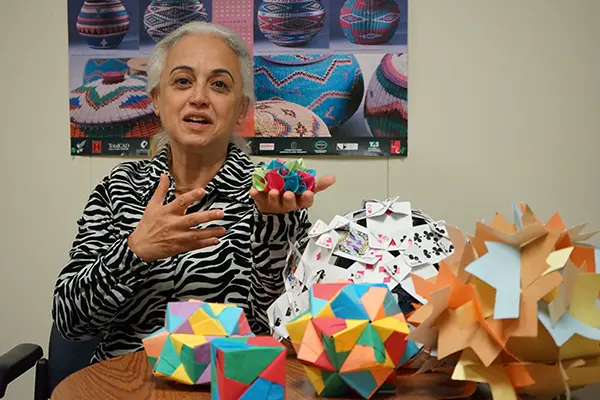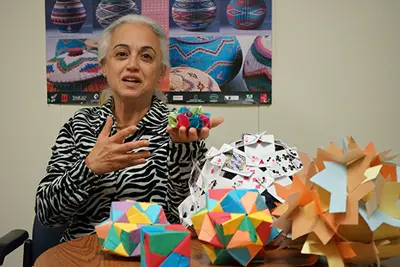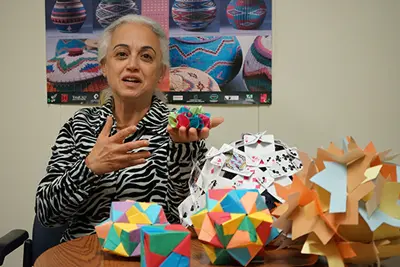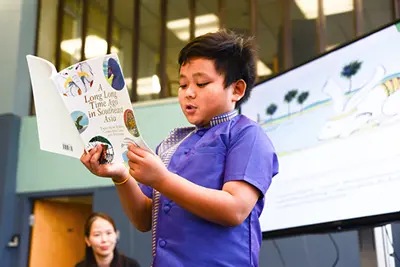Chahine to Work with Teachers in South African High Schools
 Image by Katharine Webster
Image by Katharine Webster
07/22/2021
By David Perry
A compass and a calculator can help teach the basics of mathematics, but Iman Chahine believes arts, games, tools and social practices used in everyday culture can make the lessons richer.
She says an unspoken language found in murals, beads and sewing patterns can help demystify mathematics for schoolchildren.
And now she has a second Fulbright U.S. Scholar Award to help prove it.
Chahine, an associate professor of education in the College of Fine Arts, Humanities and Social Sciences, recently received her second Fulbright award to complete her mission to introduce ethno-mathematics into lessons at South African high schools.
Chahine will continue to collaborate with researchers at North-West University’s campus in Potchefstroom, South Africa, where she was named an honorary research fellow. She started working with the South African educators after she got her first Fulbright award in 2019.
Recipients of Fulbright U.S. Scholar Awards are selected by the Department of State and the J. William Fulbright Foreign Scholarship Board. The awards support international research by faculty with exemplary records of academic and professional achievement, service and leadership potential.
Chahine arrived in South Africa in late December 2019, expecting a nine-month stay. Her goal? Weaving into high school mathematics curriculum indigenous arts, technologies and practices by Zulu and Ndebele people.
Post-apartheid, South Africa has put aside European textbooks and requires its schools to incorporate indigenous knowledge systems into the K-12 curriculum. Chahine was to write lessons and prepare teaching materials and observe teachers in the classroom.
She got to South Africa right as the COVID-19 pandemic was starting.
“It was not really felt in South Africa as much as it was here at that point. Eventually, we stopped going to the campus, but we continued to prepare research materials,” she says.
By July 2020, South Africa was in national lockdown and the rate of COVID infection was peaking. Chahine returned to the U.S.
The new Fulbright award will take Chahine back to South Africa in January 2022. She will work with partner institutions including the School of Natural Sciences and Technology for Education and the Self-Directed Learning Research Center at North-West University, the South African National Research Foundation and the South African Department of Higher Education and Training to complete a series of interrelated ethno-mathematics research projects.
Chahine, who joined the School of Education faculty in 2018 as part of a global hiring initiative, specializes in using mathematics to describe cultural practices and in using hands-on cultural practices to teach math. Beadwork and baskets with repeated geometric motifs, ethno-modeling and weaving are all embodied forms of mathematical thinking, she says.
Chahine recalls being fascinated by the geometric patterns her mother strategically pieced together when sewing clothes for the family. It wasn’t a formal education that taught her mother how to make the clothing, but a cultural one.
“She had a different understanding of mathematics,” says Chahine. “And there are different ways of teaching.”
In the 1990s, Chahine, a native of Lebanon, was studying at American University of Beirut. She noticed child street vendors and began studying the mathematics they used. Theirs was the self-made math of survival, crafted outside the classroom, she says. Her ethno-mathematical studies resulted in a Ph.D. from the University of Minnesota in 2008.
This is about “a different way of teaching, a different way of seeing mathematics,” she says.
And it’s about finding a more complete way to see the world.




